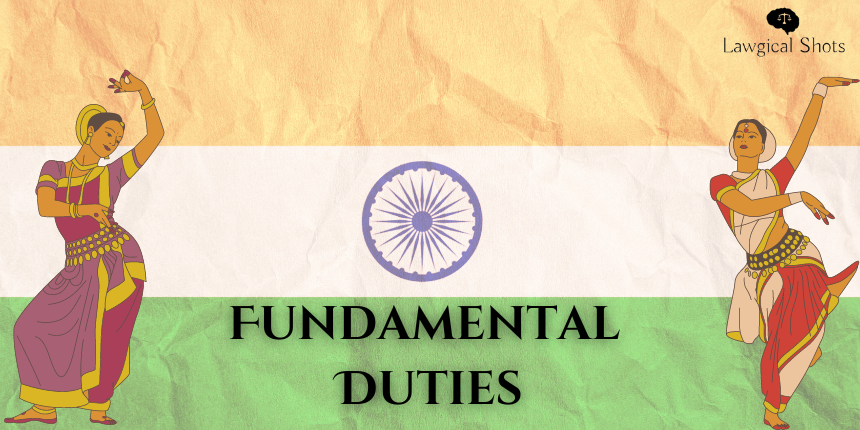Humans are social animals bound by civil norms. In the modern era, there are codified laws which define the rights of persons and remedies available in case of violation. While rights give a sense of entitlement, duties strike a balance to the same. The Constitution of India is the grundnorm governing the legal setup, and the fundamental rights are a gift to the people. On the other hand, another important aspect is the fundamental duties of Indian Constitution which ignite a sense of responsibility, a cardinal facet for the society. While the concept was not originally adopted, do you know which country was it inspired from? Have a look below and explore the fundamental duties as provided under the Constitution of India.
Fundamental Duties of Indian Constitution – Article 51A
While fundamental rights under the Constitution of India are enveloped in Part 3 of the same, the part IV A of the Constitution contains fundamental duties under Article 51A. The said Article contains 11 sub-pointers which impose the fundamental duties upon every citizen of India.
Fundamental duties taken from which country?
The idea of fundamental duties of Indian Constitution cropped from the then USSR Constitution, now Russia. It is an interesting fact that the Constitution of India which came into full force in 1950 did not include Fundamental Duties. It was the 42nd Constitutional Amendment in 1976, also termed as the ‘Mini Constitution’, which included 10 fundamental duties, inspired from the USSR Constitution. Later, in 2002, the 86th Constitutional Amendment accompanied the 11th fundamental duty.
What are the 11 Fundamental Duties under Constitution?
- Abide by Constitution
When we talk about running the country, the Constitution of India is above any religious texts like Geeta or Quran. The Tricolour flag is incomparable to any religious flags or symbols, and the National Anthem is the most respectful and cherished as compared to any Bollywood hit song. This stance is supported by Article 51A(a), which imposes the duty upon citizens to “abide by the Constitution and respect its ideals and institutions, the National Flag and the National Anthem”.
- Follow Ideals inspiring National Struggle
We got freedom in 1947, the year which engraved itself forever in Indian history. The event marks the sacrifices of numerous people who fought against British Rule, which cannot be and shall not be forgotten. As per Article 51A(b) of fundamental duties of Indian Constitution, every citizen shall “cherish and follow the noble ideals which inspired our national struggle for freedom”.
- Uphold and Protect Sovereignty
India is one, and any attempt to hamper this oneness should be discouraged. Article 51A(c) of the Indian Constitution imposes the duty to “uphold and protect the sovereignty, unity and integrity of India”.
- Defend the Country
It is the duty of every citizen to “defend the country and render national service when called upon to do so” as provided under Article 51A(d). This fundamental duty of Indian Constitution cautions everyone against extreme circumstances like war, and seeks citizen support when so called, for the sake of national service by defending the country.
- Promote Harmony and Brotherhood
The unity of any country is more affected by inner factors as compared by any neighbour or foreign powers. Maintaining this sense of harmony among the citizens is crucial, be it religion, language, region or sects. After all, diversity is India’s superpower. In addition, women are part of the society, making half of it and raising the other half, and thus, their dignity should be upheld in all cases. This is also embedded as one of the fundamental duties under Constitution of India. Reciting the words under Article 51A(e), it is the duty of Indian citizens “to promote harmony and the spirit of common brotherhood amongst all the people of India transcending religious, linguistic and regional or sectional diversities; to renounce practices derogatory to the dignity of women”.
Also read: Article 14 – Right to Equality
- Preserve Cultural Heritage
Indian culture is diverse and reflects our values. There is no other country like India which is a bouquet of diverse heritage. The citizens of India have a duty under Article 51A(f) to “value and preserve the rich heritage of our composite culture”.
- Protecting Natural Environment
When we talk about humans, they are just a part of the environment, who are bound to harmonise and protect other organisms. Thus, it is the duty of citizens of India “to protect and improve the natural environment including forests, lakes, rivers and wildlife, and to have compassion for living creatures” as per Article 51A(g).
- Develop Scientific Temper and Humanism
Humans are intelligent beings, and science is a gift to mankind for the betterment of one and all. That is why encouraging inquisitive nature is a must for the upcoming generations. Article 51A(h) of the Indian Constitution casts a fundamental duty upon citizens to “develop the scientific temper, humanism and the spirit of inquiry and reform”.
- Safeguard Public Property
Damaging public property in the instance of rage is seen often. But people eventually neglect the fact that violence is not a solution for any trouble, and any loss to public property is the ultimate loss of the public, that is you and me. While this has to be common sense, the Constitution expressly deals with the situation casting a sense of duty among Indians. The fundamental duty of Indian citizens to “safeguard public property and to abjure violence” is laid under Article 51A(i) of the Constitution.
- Excellence in All Spheres
A student excelling at academics should be encouraged, but so should be an athlete or sportsman. That’s how any country strikes a balance by encouraging all stakeholders to achieve better accomplishments for the country. Article 51A(j) of the fundamental duties of Indian Constitution states that “to strive towards excellence in all spheres of individual and collective activity so that the nation constantly rises to higher levels of endeavour and achievement” is a duty cast upon every Indian citizen.
- Education to Children
While education has been encouraged in India since years, the same was adopted as a fundamental right in the year 2002 only, through the 86th Constitutional amendment. In pursuance of the same, the Article 51A(k) casts a duty upon parents and guardians to “provide opportunities for education to his child or, as the case may be, ward between the age of six and fourteen years”.
Conclusion
While the fundamental duties of Indian Constitution seem to be a great idea for incorporating a sense of responsibility among citizens of India, there is no binding effect behind them. In other words, while fundamental rights can be enforced through Articles 32 and 226, there is no such provision in case of fundamental duties, unless a separate law is enacted laying the express provisions in case of diversion.







